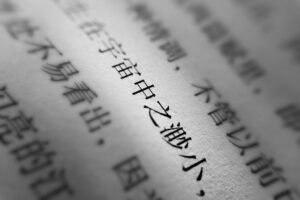Chinese numerals have a long and rich history that dates back thousands of years. Unlike the Arabic numerals that are commonly used in the Western world, Chinese numerals are based on a decimal system and have their own unique characters. The origins of Chinese numerals can be traced back to ancient China, where they were developed and refined over time.
In comparison to Arabic numerals, Chinese numerals have a more pictorial representation. Each number is represented by a character, which adds a visual element to the numerical system. This can make learning Chinese numerals a bit more challenging for those who are accustomed to the simplicity of Arabic numerals.
Table of Contents
ToggleKey Takeaways
- Chinese numerals are a unique and important aspect of Chinese culture.
- Understanding the basic number system is crucial for mastering Chinese numerals.
- Number symbolism plays a significant role in Chinese culture and language.
- Counting from 1 to 10 in Chinese is relatively simple and straightforward.
- Mastering numbers 11 to 20 and counting from 21 to 99 in Chinese requires some memorization and practice.
Understanding the Basic Number System
The Chinese number system is based on the decimal system, which means that it uses a base of 10. This is similar to the Arabic numeral system, which also uses a base of 10. In the decimal system, each digit’s value is determined by its position in the number.
In terms of pronunciation, the numbers 0-9 in Chinese are as follows:
0 – líng零
1 – yī一
2 – èr二
3 – sān三
4 – sì四
5 – wǔ五
6 – liù六
7 – qī七
8 – bā八
9 – jiǔ九
The Importance of Number Symbolism in Chinese Culture
Numbers hold great significance in Chinese culture, as they are believed to have symbolic meanings and can bring luck or misfortune. Certain numbers are considered lucky, while others are considered unlucky.
The number 8 is considered extremely lucky in Chinese culture because it sounds similar to the word for wealth or prosperity. It is often associated with financial success and is commonly used in phone numbers, license plates, and addresses.
On the other hand, the number 4 is considered unlucky because it sounds similar to the word for death. It is often avoided in Chinese culture, and buildings may skip the 4th floor or room numbers with the number 4.
Counting from 1 to 10 in Chinese
| Number | Chinese Character | Pronunciation |
|---|---|---|
| 1 | 一 | yī |
| 2 | 二 | èr |
| 3 | 三 | sān |
| 4 | 四 | sì |
| 5 | 五 | wǔ |
| 6 | 六 | liù |
| 7 | 七 | qī |
| 8 | 八 | bā |
| 9 | 九 | jiǔ |
| 10 | 十 | shí |
To count from 1 to 10 in Chinese, you would say:
1 – yī一
2 – èr二
3 – sān三
4 – sì四
5 – wǔ五
6 – liù六
7 – qī七
8 – bā八
9 – jiǔ九
10 – shí十
These numbers are represented by their respective characters in written form. For example, the character for 1 is 一, and the character for 2 is 二.
Common phrases using these numbers include:
– 一个人yī gè rén (one person)
– 两个小狗iǎng gè xiǎo gōu (two small dogs)
– 三天sān tiān (three days)
– 五分钟wǔ fēn zhōng (five minutes)
– 八年bā nián (eight years)
Mastering Numbers 11 to 20 in Chinese
To count from 11 to 20 in Chinese, you would say:
11 – shí yī十一
12 – shí èr十二
13 – shí sān十三
14 – shí sì十四
15 – shí wǔ十五
16 – shí liù十六
17 – shí qī十七
18 – shí bā十八
19 – shí jiǔ十九
20 – èr shí二十
These numbers follow a pattern where the tens digit comes before the ones digit. For example, to say 11, you would say “ten one” (十一shí yī). To say 12, you would say “ten two” (十二shí èr).
Common phrases using these numbers include:
– shí yī gè rén 十一个人(eleven people)
– shí sì tiān十四天 (fourteen days)
– shí wǔ fēn zhōng 十五分钟(fifteen minutes)
– èr shí nián二十年 (twenty years)
How to Count from 21 to 99 in Chinese
To count from 21 to 99 in Chinese, you would follow a similar pattern as counting from 11 to 20. The tens digit comes before the ones digit, and the word for “and” (líng) is used between the tens and ones digits.
For example:
21 – èr shí yī二十一
22 – èr shí èr二十二
30 – sān shí三十
40 – sì shí四十
50 – wǔ shí五十
60 – liù shí六十
70 – qī shí七十
80 – bā shí八十
90 – jiǔ shí九十
The Quirks of Chinese Number Pronunciation
One of the challenges of learning Chinese numerals is understanding the different tones used in pronunciation. Chinese is a tonal language, which means that the tone in which a word is spoken can change its meaning.
For example, the number 1, yī, is pronounced with a high level tone. However, if you were to say yī with a rising tone, it would mean “clothing.” Similarly, if you were to say yī with a falling tone, it would mean “together.”
This can make learning Chinese numerals a bit more complex, as the tone in which a number is pronounced can change its meaning. It’s important to pay attention to the tones when learning and practicing Chinese numerals.
Tips for Memorizing Chinese Numbers
Memorizing Chinese numbers can be challenging, but there are several mnemonic devices and practice exercises that can help make the process easier.
One mnemonic device is to associate each number with a visual image. For example, you could imagine the number 1 as a flagpole, the number 2 as a swan, and so on. Creating vivid mental images can help make the numbers more memorable.
Another tip is to practice writing the Chinese characters for each number. This can help reinforce your memory and improve your recognition of the characters.
Using Chinese Numbers in Everyday Life
Chinese numbers are used in a variety of everyday situations, from counting money to telling time. It’s important to be able to recognize and understand Chinese numbers in order to navigate these situations.
For example, when shopping in China, you will need to be able to understand and communicate prices using Chinese numbers. Similarly, when telling time, you will need to be able to recognize and pronounce the numbers on a clock.
To write numbers in Chinese characters, you would use the respective characters for each number. For example, to write the number 5, you would use the character 五.
Fun Facts About Chinese Numerals
– The number 6 is considered lucky in Chinese culture because it sounds similar to the word for “smooth” or “well-off.”
– The number 9 is considered lucky because it sounds similar to the word for “long-lasting” or “eternal.”
– The number 520 is often used as a way to say “I love you” in Chinese because it sounds similar to the phrase “wǒ ài nǐ” (我爱你).
– The number 250 is often used as a slang term in Chinese to mean “stupid” or “idiot.”
In conclusion, learning Chinese numerals can be a challenging but rewarding endeavor. Understanding the history and significance of Chinese numerals can provide valuable insights into Chinese culture and language. By mastering the pronunciation and characters of Chinese numbers, you can navigate everyday situations and communicate effectively in Chinese. So, don’t be afraid to dive into the world of Chinese numerals and continue your journey of learning and discovery.
Contact our head teacher, Chen Huimin, at info@lcchineseschool.com if you want to learn Chinese or have additional questions about our Chinese programs.
Sign up for a free trial class here.
Learn about our Internship Program in China.
Get free Chinese learning resources.
Learn about China’s 2024 Offical Holiday Schedule








